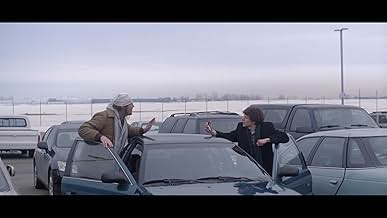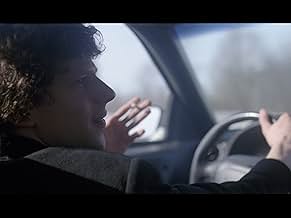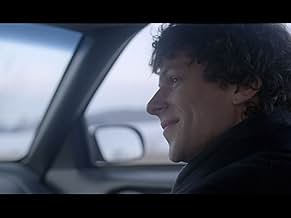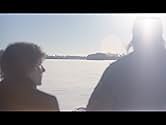A história da entrevista de cinco dias entre o repórter da Rolling Stone David Lipsky e o aclamado romancista David Foster Wallace, que aconteceu logo após a publicação do romance épico inov... Ler tudoA história da entrevista de cinco dias entre o repórter da Rolling Stone David Lipsky e o aclamado romancista David Foster Wallace, que aconteceu logo após a publicação do romance épico inovador de Wallace, 'Infinite Jest', em 1996.A história da entrevista de cinco dias entre o repórter da Rolling Stone David Lipsky e o aclamado romancista David Foster Wallace, que aconteceu logo após a publicação do romance épico inovador de Wallace, 'Infinite Jest', em 1996.
- Direção
- Roteiristas
- Artistas
- Prêmios
- 4 vitórias e 18 indicações no total
- Bookstore Patron 2
- (as Jennifer Holman)
- Student 5
- (as Javon Anderson)
- Direção
- Roteiristas
- Elenco e equipe completos
- Produção, bilheteria e muito mais no IMDbPro
Avaliações em destaque
In 1996 David Lipsky (Jesse Eisenberg) interviewed acclaimed author David Foster Wallace (Jason Segel) over the course of several days in Minneapolis for a book tour about his 1000 page epic novel, Infinite Jest. Essentially a two hander in the spirit of the recent True Story, about the interview with alleged murderer Christian Longo (James Franco), The End of the Tour is one of the most accessible biopics about smart people in recent memory.
What sets The End off from True Story and other stories about gifted, troubled authors is its easy manner that doesn't play up intellectual snobbery but rather tries to understand the isolation and diffidence of geniuses. While Lipsky is not the genius writer that Wallace is, he is still a published novelist and a writer for Rolling Stone—the boy has the chops that allow him to get inside Wallace, as much as that is possible with writers slightly less private than, say, JD Salinger.
Wallace reveals himself, albeit obliquely, as a talented working class author bedeviled by addictions that seem to feed his insecurities: Obsessed by TV, he decides not to have one because he'd watch it; having overdosed on booze, he decides not to drink; whether or not he became addicted to heroin is uncertain.
What is certain is that as individualistic as Wallace is, and his densely verbose prose would confirm that, he is still one of us just trying to figure out his existential place in a chaotic world. His immersion in pop culture makes the brainy prose readable and enjoyable because he is tuned in and while heavily analytical, in touch with our daily experience.
Such is the spirit of The End of the Tour: it frequently relies on the mundane (e.g., pop tarts for breakfast, McDonald's for dinner, old TV shows for entertainment) to allow the more challenging—why he wears a bandanna—to reveal his soul (he worries that Lipsky's question about the affectation of the bandanna now makes himself conscious about wearing it, as if he were trying for an impression when he actually wasn't). His prose can be downright entertaining: "Because here's something else that's weird but true: in the day-to day trenches of adult life, there is actually no such thing as atheism. There is no such thing as not worshiping. Everybody worships. The only choice we get is what to worship."
Segel is a revelation as an actor. From mediocre romcoms to perfectly embodying a conflicted writer, Segel remains in low-key character throughout. Here's what Wallace says about the loneliness that was his constant companion before he committed suicide:
"Fiction is one of the few experiences where loneliness can be both confronted and relieved. Drugs, movies where stuff blows up, loud parties — all these chase away loneliness by making me forget my name's Dave and I live in a one-by-one box of bone no other party can penetrate or know. Fiction, poetry, music, really deep serious sex, and, in various ways, religion — these are the places (for me) where loneliness is countenanced, stared down, transfigured, treated." (The Pale King, 2011)
Introduce yourself to this verbal magician by seeing one of the best films of the year: The End of the Tour.
The story is about an odd sort of interview that took place when David Lipsky (Eisenberg) of Rolling Stone Magazine hung out with literary star David Foster Wallace (Segal) for several days back in the late 1990s. Cutting right to the chase, the film begins with the announcement that Wallace committed suicide and the film is a flashback as Lipsky remembers the strange and very lengthy meeting the two had back in 1996. As I said, this lasted days as the two just hung out together and talked...making it far different than a typical magazine interview.
As far as what they talk about and the themes of their meeting go, this really isn't something I can really explain very well in a review-- you just need to see it and experience it. Instead, I would rather try to convey the style of their time together on the film. It feels like you are a fly on the wall as two intellectuals talk and talk and talk....and talk. Wallace generally presents more as an 'Every Man' sort of guy while Lipsky seems, at times, as if he's trying to impress his new friend with his intellectual prowess. What all this means...well, that's really up to the viewer.
The bottom line is that if you really like action films, this film's is probably not for you. If you love 'literature' as opposed to just reading a book for enjoyment, this movie might be exactly what you'd love to see. As for me, I think I'm in the middle on this one. I can really respect the acting as well as the filmmakers' desire to make a quality picture as opposed to a mass-marketed film. But, on the other hand, the film is slow and very deliberate. It also took a while until I really stared to appreciated it...and I'm not if I ever exactly enjoyed it.
Jason Segel absolutely owned this film, with an eye opening & career-defining performance far from his usual comfortable roles in comedies. His portrayal of David Foster Wallace was so on point, that the complexities of the character naturally flourishes. Also, his expositions simply captivates. His robust & free flowing delivery leaves us, the audience, in the exact same position as Jesse Eisenberg's character - hanging onto his every detail, with a craving for more.
Apart from Segel's Oscar worthy delivery, the illuminating subject matters were just as mesmerizing. As our leads converse on love, loneliness, fame, career & social trends, the film then connects on a personal level, in more ways than one. It is a kind of film that invites self-reflection & embeds ideas on how to live life.
Overall, The End of the Tour is a film that imparts reverence for the character that is David Foster Wallace, by way of picking through the brains of the great writer. It does so through incredibly true and entertaining intellectual discussions that offers the film's inspiring moments. Brilliantly acted, thought provoking and profoundly moving, this independent film demands deeper appreciation, and I happily oblige.
Você sabia?
- CuriosidadesThe song heard on the soundtrack when the film ends is "The Big Ship" by Brian Eno, one of David Foster Wallace's favorite songs. It was also used for the climax of Eu, Você e a Garota Que Vai Morrer (2015), another film that premiered at the 2015 Sundance Film Festival.
- Erros de gravaçãoIn regards to the scene where Mrs. Gunderson gives Mr. Wallace and Mr. Lipsky a car tour of Minneapolis sites: The Mary Tyler Moore statue on Nicollet Mall in Minneapolis, was not given to the City by TV Land until 2002. Also, it is not legal for cars to drive down Nicollet Mall.
- Citações
David Foster Wallace: It may be in the old days what was known as a spiritual crisis: feeling as though every axiom in your life turned out to be false... and there was actually nothing. And that you were nothing. And that it's all a delusion and you're so much better than everybody 'cause you can see how this is just a delusion, and you're so much worse because you can't fucking function.
- Cenas durante ou pós-créditosHalfway through the closing credits, there is an extra scene told from the perspective of David Foster Wallace as Lipsky goes to the bathroom to wash out the chewing tobacco. It shows what Wallace did while he was in the bathroom: he speaks privately into the tape recorder.
Principais escolhas
- How long is The End of the Tour?Fornecido pela Alexa
Detalhes
- Data de lançamento
- País de origem
- Central de atendimento oficial
- Idioma
- Também conhecido como
- El último tour
- Locações de filme
- Empresas de produção
- Consulte mais créditos da empresa na IMDbPro
Bilheteria
- Faturamento bruto nos EUA e Canadá
- US$ 3.002.884
- Fim de semana de estreia nos EUA e Canadá
- US$ 123.238
- 2 de ago. de 2015
- Faturamento bruto mundial
- US$ 3.072.991
- Tempo de duração
- 1 h 46 min(106 min)
- Cor
- Mixagem de som
- Proporção
- 2.35 : 1


































